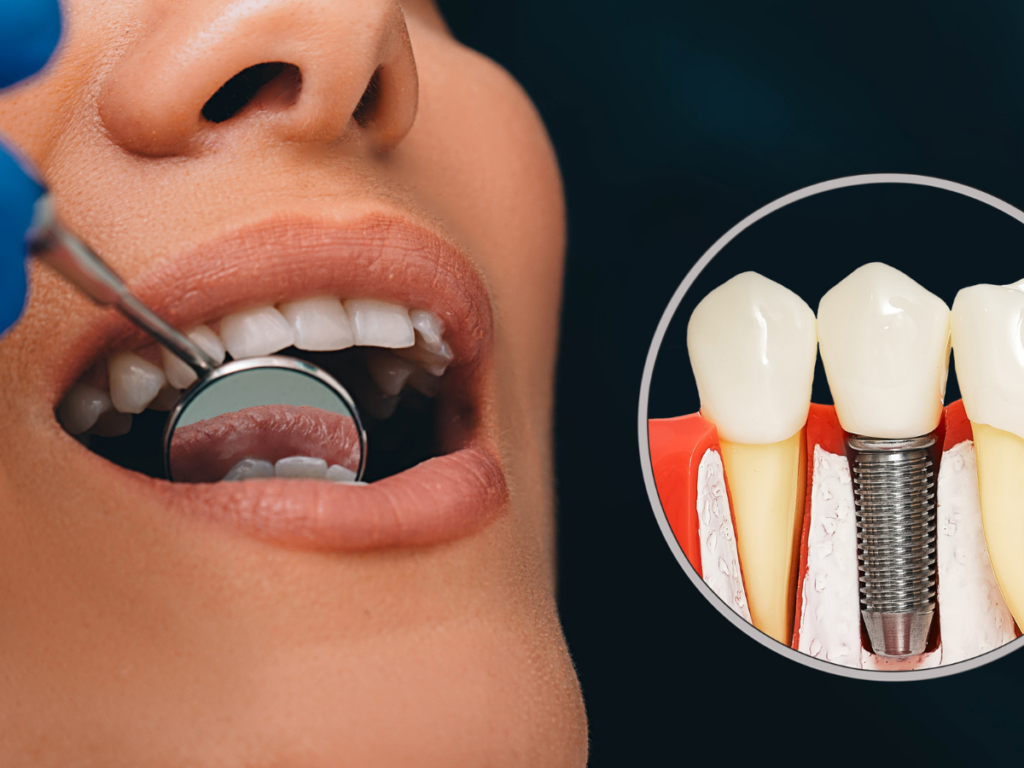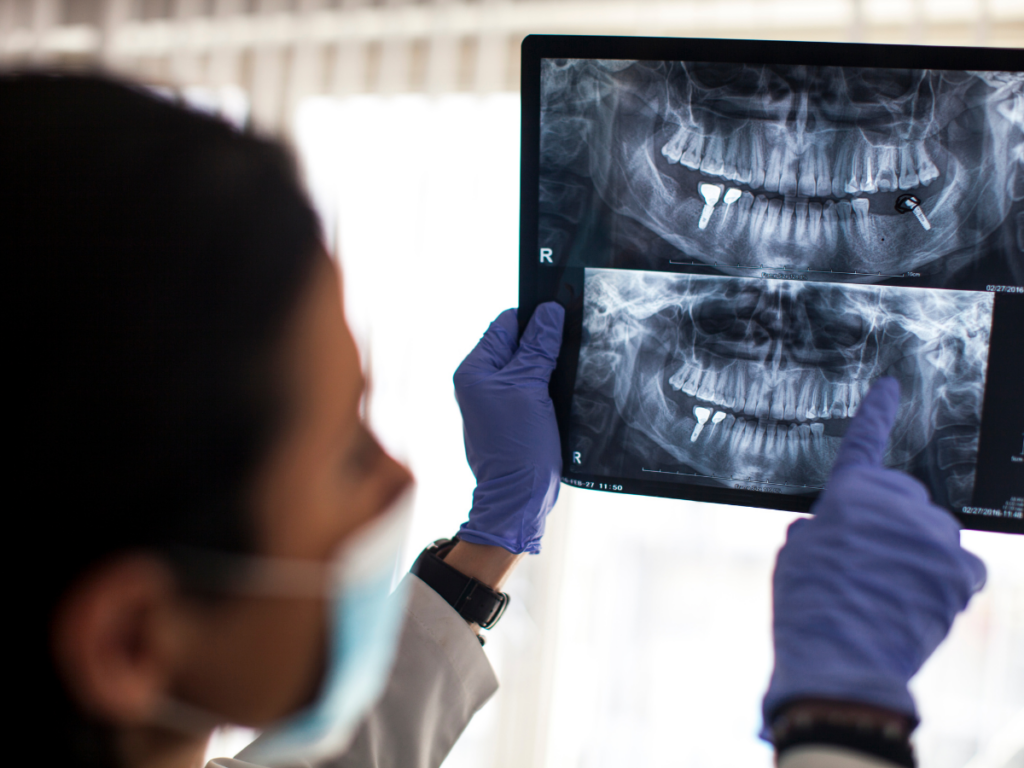Losing a tooth or several teeth can be a traumatic experience for anyone. In the past, dental bridges or dentures were the common solutions for missing teeth. However, recent advances in dental technology have led to the introduction of mini dental implants.
Mini dental implants (MDIs) are a more modern and attractive option for patients who want to replace missing teeth and restore their smile. This blog post is about everything that you need to know about mini dental implants.
Mini dental implants are small titanium screws that act as artificial tooth roots. These screws are inserted into the jawbone and provide a stable base for dental crowns, bridges, or dentures.
Mini dental implants are called "mini" because they are only about half the size of traditional dental implants.
The process of placing mini dental implants is usually faster and simpler than placing traditional dental implants. Mini dental implants can be inserted into the jawbone without making a large incision, and the recovery time is brief.
Typically, the procedure can be performed in a single visit. However, it is essential to consult a professional dentist to make an informed decision about whether mini dental implants are the best option for your oral health.
Mini dental implants have several advantages over traditional dental implants, including:

Caring for mini dental implants is similar to the care required for natural teeth. You should brush and floss regularly and go for regular dental checkups to maintain optimal oral health. Your dentist may also recommend a specific diet that helps to prevent any damage to the implant or the prosthetic teeth on top of it.
Mini dental implants are suitable for patients who:
There are several factors that determine whether mini dental implants or Traditional dental implants are the best choices for a patient. The type of implant needed and the condition of the jawbone must be carefully evaluated to decide which option is most suitable for each individual case.
Mini dental implants may not be an appropriate treatment option for individuals with weakened jawbones, as they cannot provide the same amount of stability and support that traditional dental implants can.
At the end of the day, it's crucial to consult a professional dentist to determine which option is best for your specific needs. The dentist can evaluate your oral health and make an informed decision about the type of implant that will work best for
Mini dental implants are a game changer in the dental industry. They provide a less-invasive, affordable, and practical solution to missing teeth. Mini dental implants provide a solution that lasts for years and protects the structure of your jawbone.
If you are considering dental implants to restore your smile, visit us at 41 Stonehouse Road in Basking Ridge, NJ.
Dr. Trichas will help you figure out if mini dental implants are the right solution for you. Simply fill out our form here or give us a call!
Dental procedures are evolving rapidly, and one such advanced procedure is dental implant bone grafting. This guide will provide a thorough understanding of this crucial procedure, its need, process, and benefits. Let's delve into the fascinating world of dental science and explore the transformative potential of dental implant bone grafting.
Dental implant bone grafting, a prominent surgical procedure, adds bone tissue to the jaw areas where implants are planned. The core aim of this operation is to regenerate bone tissue, providing a strong and robust foundation for dental implants.
This additional bone can be derived from your body, a donor, or even from synthetic or animal sources. Once the bone graft material is inserted into the jaw, the region is allowed to heal, fusing with the existing bone tissue.
In some cases, bone grafting may be essential to move forward with the dental restoration process. Dental implants are incredibly powerful tools for restoring teeth, but they require a strong base of bone to be securely placed. If the jawbone is not sufficiently dense or has already begun to deteriorate due to periodontal disease, then dental implant bone grafting might be necessary.
By introducing new, healthy tissue to the area, jawbone density and quality can be improved. This helps to ensure that the implant is placed correctly and with greater stability, leading to higher success rates for long-term dental restoration.
Several factors necessitate bone grafting in dental implant treatment:
Gum disease often damages the bone tissue supporting teeth, leading to gum recession and bone loss. If insufficient bone remains in the jaw, dental implant bone grafting is crucial to rebuild the area.
Trauma to the jaw can result in bone loss, making dental implant bone grafting necessary for successful implant placement.
With age, our bones may weaken and thin, a condition that also affects the jaw bone. Increasing the bone density is then required before placing dental implants.
The loss or extraction of a tooth can trigger deterioration of the supporting bone tissue over time, potentially reducing the bone volume.
Before the actual grafting procedure begins, your dentist will need to do a thorough examination of your jawbone using X-rays or CT scans in order to assess the area and determine if a graft is necessary.
Once it’s determined that the bone structure of your jaw is not sufficient for implant placement, the doctor will recommend the dental implant bone grafting procedure as part of your dental restoration plan.
The type of graft material used will depend on several factors such as the location and size of the site to be augmented. Depending on several factors, a variety of methods may be used. This includes procedures such as socket grafting or sinus lift surgery, in which new bone material is implanted directly into the jawbone while it's still healing from extraction.

Dental implant bone grafting can offer a plethora of benefits, including:
Healthy and strong bones are necessary for dental implants to fuse with, contributing to long-term success. Bone grafting makes this possible.
Dental implants anchored in strong bone tissue provide enhanced stability and longevity.
Bone loss and missing teeth can cause a sunken, aged facial appearance. Dental implant bone grafting can restore bone density and improve facial aesthetics.
Dental implant bone grafting is a reliable and effective procedure, allowing you to regain natural-looking teeth.
Considering dental implant treatment but dealing with bone loss? Dental implant bone grafting might be a prerequisite to make the procedure feasible.
At Dr. Trichas's office in Basking Ridge, we specialize in dental implants and can help patients who have suffered bone loss achieve optimal oral health and regain their confident smiles.
Contact us today to learn more about dental implant treatment and understand if bone grafting is the right choice for you.
Missing teeth can be a frustrating experience for anyone. Luckily, there are versatile solutions that can help you regain your smile. One of the most popular and effective options is dental implants. Although the dental implant success rate rate varies per patient, it is generally an excellent option for those missing one or more teeth.
But what is this success rate, and how can you ensure that your dental implant procedure is successful? In this blog post, we’ll explore everything you need to know as a patient about dental implant success rates to help you make an informed decision.
Dental implants come in various shapes and sizes, but the most popular one is a titanium post. This post acts as a substitute for the missing tooth root, once installed directly into the jawbone. Once healed, an implant has a permanent crown, bridge, or denture. It is a trusted solution for its durability, stability, and realistic look and feel, making it a popular choice for patients of all ages.
The dental implant success rate is determined by the osseointegration process. Osseointegration refers to the process of your bone tissue’s fusing with the implant over time, bonding it securely to your jaw. The success of osseointegration is critical in determining your implant’s long-term effectiveness and functionality.
Although different studies have various definitions of success, implants' success rate can range from anywhere between 90% to 98% over a ten-year period.
The high success rate, coupled with the fact that implants essentially allow you to function as if you had your natural teeth, make dental implants the best solution for tooth replacement.

Several factors affect dental implant success rates, including the patient's oral health, the type of implant used, the expertise of the dentist, and the patient's lifestyle habits. Patients with a history of dental complications such as gum disease and smoking are more likely to have implant failures.
An experienced dentist with the latest technology and in-depth knowledge can significantly increase the success rate of your dental implants.
Dental implant surgery is not a set-it-and-forget-it solution. Post-operative care is a critical aspect of ensuring a successful implant outcome. Patients should be mindful of their oral hygiene, follow post-operative instructions, and attend follow-up appointments regularly.
Good oral care can prevent complications such as implant infection, premature motion, or crown failure, which can affect the implants' success. To ensure success, patients should also eat healthily, avoid drinking and smoking, and maintain regular dental appointments.
Dental implants offer an effective and long-lasting solution for tooth loss. The success rate is high, provided the patient follows post-operative instructions. Additionally, the advances in technology now allow dentists to place implants with little or no discomfort, making it a painless and convenient solution for most patients.
With proper care and regular maintenance, dental implants can provide you with enhanced comfort, improved oral health, and a beautiful smile!
However, dental implant success rates vary from patient to patient, depending on several factors, including:
Whether you're considering implants or already have them, it's vital to understand what the recovery process entails and what you can do to increase their chances of success.
At Dr. Trichas's office in Basking Ridge, our experienced team is here to answer any questions you may have and provide the resources and support you need for a successful implant outcome. We've helped hundreds of patients regain their smile, and we can help you too.
In the event of a dental crisis, finding a trusted Emergency Dentist NJ can be a daunting task. With such a wide variety of dental issues that can be classified as emergencies, it's essential to understand which ones require immediate attention. This is where we step in to ensure your dental emergencies are handled swiftly, professionally, and with the highest level of care.
So, what is typically considered a dental emergency? Dental emergencies often involve severe pain, sudden discomfort, or damage to the teeth or gums. Some common dental emergencies include knocked-out teeth, loose or broken teeth, severe toothache, or injuries to your gums or mouth. Regardless of the cause, immediate care is critical to prevent further complications and protect your dental health.
At our clinic, we're always prepared to handle these situations. As an experienced Emergency Dentist in NJ, we prioritize your comfort and safety above all else, ensuring that we're available to assist when you need us the most.
During dental emergencies, time is often of the essence. It's crucial not to ignore these problems, hoping they will go away. Instead, seek professional assistance promptly. If you're unsure whether your condition qualifies as an emergency, it's best to err on the side of caution and get in touch with an Emergency Dentist NJ. Our dedicated team will assess your situation and provide the necessary guidance.
Apart from offering emergency dental services, we're also committed to helping our patients maintain good dental health. Regular check-ups, professional cleanings, and proper oral hygiene practices can prevent many dental emergencies from occurring in the first place.
Aside from emergencies, we provide a range of comprehensive dental services. If you're looking to enhance the appearance of your smile, our cosmetic dentistry services can assist you. Whether you're considering teeth whitening, veneers, or a full smile makeover, our team of experts is ready to meet your needs.
We also offer advanced restorative treatments like dental implants and dentures. If you're uncertain about which solution is right for you, take a look at our implants vs. dentures pros and cons guide for more insight.
Moreover, our general dental care includes services like cleanings, fillings, root canals, and preventive care. Understanding the root canal treatment planning, cost, procedure, and risks can prepare you for what to expect should you require this treatment.
Dr Trichas believes that every patient deserves access to high-quality, immediate dental care when they need it. We accept a wide range of insurance plans and offer flexible payment options to ensure that our emergency dental services are accessible to everyone.
Our staff is always available to assist you with insurance claims and paperwork. If you're unsure whether your insurance covers emergency dental care, don't hesitate to contact us. We're more than happy to answer any questions you have about our payment options.
We also understand that dental emergencies can be stressful and financially challenging. For uninsured patients or those whose insurance doesn't cover all the costs, we offer various financing options. Our goal is to make sure that nothing stands in the way of you receiving the urgent dental care you need.
Facing a dental emergency can be stressful, but with a reliable Emergency Dentist NJ by your side, you can rest assured you're in capable hands. Whether it's an unexpected dental emergency or routine care, we're committed to providing top-notch service that meets and exceeds your expectations.
Schedule your free consultation today, and let us help you achieve and maintain a healthy, beautiful smile.
When it comes to emergency dental care, many patients have questions. Here are some of the most common:
A dental emergency is typically defined as a situation that involves sudden or severe toothache, knocked-out teeth, loose or broken teeth, injuries to the soft tissues of the mouth, or severe infections. If you're experiencing any of these conditions, you should seek immediate help from an emergency dentist in NJ.
At our clinic, we understand that dental emergencies can happen at any time and can cause significant discomfort. That's why we offer prompt and effective emergency dental services to provide relief and address the underlying issue. Don't hesitate to reach out to us if you're in need.
It's crucial to stay calm and act promptly in a dental emergency. If you're experiencing severe pain or have suffered a dental injury, contact us immediately. We'll provide guidance and arrange an immediate appointment if necessary.
While not all dental emergencies can be avoided, maintaining good oral hygiene, wearing protective gear during sports, and having regular dental check-ups can significantly reduce the risk.
Need to see a dentist immediately? Give us a call at 908-952-2087 or Contact Us Here.
The journey to restoring your smile with dental implants does not end with the surgery. The recovery phase is an integral part of the process and plays a pivotal role in the success of the implants. Although dental implant surgery has a high success rate, understanding the recovery process and following the necessary precautions can greatly contribute to the longevity of your dental implants.
Dental implant surgery involves replacing missing teeth roots with screw-like metal posts and replacing damaged or missing teeth with artificial teeth that function and look much like real ones.
Typically, the recovery process after dental implant surgery varies from person to person. Factors such as the number of implants placed, individual healing ability, and the overall health of the patient can affect the recovery timeline.
Generally, the recovery period can take several weeks to a couple months.
After surgery, it is normal to experience some pain and bleeding at the surgical sites. Pain medications such as acetaminophen or ibuprofen can help in relieving discomfort during this time. Your dentist may also recommend an antibiotic to prevent infection. Swelling may also occur at the surgical sites and can be managed with cold compresses.
Immediately following your dental implant surgery, it's essential to follow your dentist's or oral surgeon's instructions. Here are some general aftercare tips:
Maintaining a healthy diet after dental implant surgery plays a crucial role in your recovery. Opt for soft, easy-to-chew foods and ensure you are well-hydrated.
Here are a few tips to make the process go smoother:
Your dentist will provide you with specific post-operative instructions. It is crucial to follow these diligently to ensure optimal healing. These instructions often include guidance on eating habits, medication regimen, and oral hygiene practices.
Keeping your mouth clean is essential to prevent infections and promote healing. Rinse your mouth with a warm saltwater solution several times a day. Be gentle when brushing around the implant site.
A balanced diet is important for your overall health and can aid in your recovery. Try to consume soft foods and avoid hard, crunchy, or spicy foods that might irritate the implant site.
Taking adequate rest is key to a speedy recovery. Also, ensure you are drinking plenty of fluids, but avoid using a straw as the sucking motion can disrupt the healing process.
Both smoking and alcohol can delay healing and negatively impact the success of your dental implants. Try to abstain from these, particularly in the first few weeks following surgery.
Follow-up appointments are essential to monitor your progress and catch potential issues early. Never skip these appointments.
Dental implant surgery can significantly enhance your quality of life, giving you back your confidence to smile, eat, and engage in social activities without worry. With a high success rate, it is a worthwhile investment in your oral health.

Recovering from dental implant surgery can be a fairly comfortable process with the right care and precautions. The key to a smooth recovery lies in following your oral surgeon's advice, maintaining good oral hygiene, and taking care of your overall health.
Remember, each person's recovery process may vary, so it's essential to listen to your body and contact your oral surgeon if you have any concerns.
For more information on dental implant surgery or to schedule a consultation, don’t hesitate to contact us.
Every year, millions of people across the globe benefit from the transformative impact of dental implants. Despite the proven effectiveness and increasing popularity of this dental procedure, misconceptions abound. These misconceptions can deter people from choosing dental implants, robbing them of an opportunity to improve their oral health and quality of life. Let's address some of these common misconceptions and reveal the truth about dental implants.
One of the most common misconceptions about dental implants is that the procedure is painful. In reality, most patients report that getting a dental implant is no more uncomfortable than a tooth extraction. The procedure is typically performed under local anesthesia, so you won't feel pain during the process. Additionally, any post-operative discomfort can be managed with over-the-counter pain relievers and usually subsides within a few days. To learn more about what to expect, you can read our guide on whether dental implants hurt.
It's true that the upfront cost of dental implants can be higher than other tooth replacement options. However, when considering the long-term benefits and cost-effectiveness, dental implants often become the more affordable choice. Dental implants can last a lifetime with proper care, unlike dentures or bridges that need periodic replacement. This makes dental implants a worthwhile long-term investment in your oral health. You can explore the cost of dental implants here.
Contrary to this misconception, dental implants are designed to look, feel, and function like your natural teeth. They are custom-made to match the color and shape of your existing teeth, resulting in a natural-looking smile. Dental implants also preserve the natural bone, improving long-term facial appearance. To see how natural dental implants can look, check out our smile makeover gallery.
While technically any dentist can perform the implant procedure, it is crucial to choose a dentist with specific training and experience in dental implants. A well-trained and experienced dentist can accurately assess your needs and execute the procedure correctly, reducing risks and improving results. We offer the best dental care in Basking Ridge, NJ, including expertise in dental implants.
Unlike dentures, which require nightly soaking and special cleaning, dental implants can be cared for just like your natural teeth. Brushing twice a day, flossing daily, and regular check-ups with your dentist are all that is needed to maintain your implants. For more tips on extending the life of your implants, you can read about dental implants aftercare.
Many people express concerns over the safety of dental implants. However, dental implants are, in fact, safe and effective. They are made from biocompatible materials, which do not cause a reaction in the body and allow the implant to fuse with the bone in a process called osseointegration. Additionally, dental implants have a success rate of up to 98%. For concerns about the safety of dental implants, you can read about dental emergency services.
While it's true that dental implants are often used to replace lost teeth in older adults, they're not exclusive to this age group. Dental implants can be a viable solution for anyone missing one or several teeth, regardless of age. They can be particularly beneficial for younger patients who have lost a tooth due to trauma or disease.
Contrary to this belief, dental implants don't require more frequent dental visits than natural teeth. After the healing period following implant surgery, routine check-ups and cleanings are typically all that's required. This misconception may come from the necessary visits during the implant process itself, which includes placement, healing, and the attachment of the dental prosthesis.
A properly placed and restored dental implant should be indistinguishable from a natural tooth. The aim of a dental implant is to restore both function and aesthetics. Dental professionals take great care in ensuring that the shape, color, and size of the dental crown attached to the implant matches your natural teeth, so your dental implant should go unnoticed.
With these misconceptions cleared, it's easier to see the true value and benefits dental implants offer to those with missing teeth. As always, consult with a dental professional to get accurate information tailored to your unique dental situation. Consider scheduling a free consultation to learn more about dental implants and if they're the right choice for you.
Understanding the facts about dental implants can help you make informed decisions about your oral health. Dental implants can offer a durable, natural-looking solution to replace missing teeth and restore your smile.
If you're considering dental implants and want to discuss further, don't hesitate to schedule your free dental implants consultation with us. We're here to guide you towards the best solution for your unique dental needs.